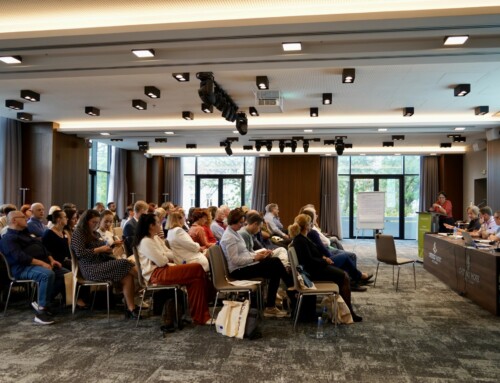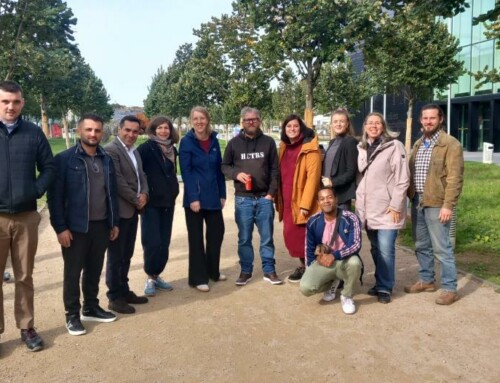This is the third time that the i2connect organized an Excellence Class training within the project. The Excellence Class training was held as a continuation of the project’s annual regular general meeting on 28-29 Septembris 2023 at the Mediterranean Agronomic Institute of Chania (MAICh) in Crete, Grieķija.
The i2connect project aims to stimulate interactive innovation processes by mobilizing actors involved in the process, such as farmers, Lineārās inovācijas tiek aizstātas ar interaktīvām, kas nozīmē, ka galvenais aspekts inovāciju izstrādes procesā ir sadarbība starp dažādiem dažādu jomu dalībniekiem., tīklā, pētniekiem, uzņēmumiem, NGOs, utt., who share their knowledge, skills and experiences to find a solution to a common problem for which they seek a solution, and they also actively participate in the creative process (koprade), taking responsibility for the creation of the result. Interactive innovation means more than a general innovation in that the process is always multi-actor from beginning to end (multi-actor approach, MAA). Lauksaimnieki, tīklā, pētniekiem, universitātes, state organizations, NGOs, financial institutions, utt. are part of the process. It is important to emphasize that interactivity alone is not enough, you need at least one coordinator, or we can also call it a project manager, who brings the process together and intervenes, if necessary, moving the project forward and supporting the work of all actors involved in the project.
Everyday advisory practice encounters many obstacles in interactive innovation processes. Some of these relate to skills and tools that advisors need help with. The i2Connect project contributes to solving this with the train-the-trainer programs, by creating a group of experts, with the aim that participants in the process share their experiences and learn from each other. Even if an advisor recognizes the importance of interactive innovation and knows what to do to implement a successful project, he needs a supportive environment within the AKIS system to grow and be successful. The aim of the Excellence Class is to create this favorable environment in order to achieve the common goal.
NAK’s task in the i2connect project is, cita starpā, to identify the actors of the Hungarian Agricultural Knowledge Transfer and Innovation System (Acs), kartē savas prasmes, and understand their operation, loma un galvenās kompetences. Papildus, the organization of trainings and study trips (savstarpējās vizītes) to identify domestic and European “good practices”. Kā daļu no šīs apņemšanās, at the end of September 2023, NAK proposed two AKIS actors representing the government sector for the Excellence Class training in Greece organized within the framework of the project, who were selected for the training after online interviews by the task manager Wageningen University.
The Excellence Class is a master course organized for managers who are connected in some way to AKIS and the field of agricultural advisory services and innovation. The inspiration from the i2connect project and the findings and lessons related to interactive innovation will be supplemented by using the experiences and ideas of the participants.
Šajā rakstā, István Madarász and Rita Szekeresné Köteles, department heads of the Ministry of Agriculture, share their experience regarding the practical training of the Excellence Class organized on the topic of interactive innovation.
Rita Szekeresné Köteles:
My colleague István Madarász and I attended the two-day Excellence Class training organized by MAICh as the only governmental (decision preparation) participants in the 18-member international team. Not only the organizers and trainers, but also the enthusiastic activity of the participants contributed to the success of the event. The professionally developed methodologies, which proved to be extremely useful for us even in theory, were tested interactively during the course through the mediation of excellent lecturers.
Among other things, we got acquainted with the “Circular Canvas for business models” developed by Circulab, with which the user can identify the main effects affecting the environment and the ecosystem in a manner similar to the principles of the circular economy. By means of the “Circular Canvas”, we can rethink our business model, which is not only based on traditional profit-oriented planning, but also takes into account social and environmental aspects, thereby improving the resilience of our business or organization.
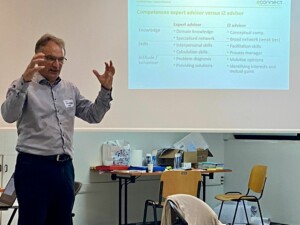
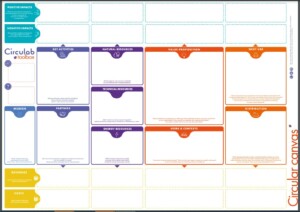
The Excellence Class training leader, Jos Verstegen, and the Circulab toolbox (Avots: Rita Szekeresné Köteles)
István Madarász:
As in most similar EU-funded projects, the fact that experts from different geographically and culturally distant regions of Europe could meet had a remarkable added value. The professionalism of the delegates from Ireland and the Netherlands, countries that can be considered as the ‘aces’ of expert advice and knowledge transfer or at least as having exceptionally good practice, resonated well with the pragmatism based on sober criticism of the colleagues from the regions of Southern, Central and Eastern Europe. Ungārijas pusē, we both came from a governmental decision preparation organizational culture, which proved to be a surprisingly useful addition during the two days of the program. No vienas puses, because we can provide more effective and targeted incentives when supporting the processes and organizations planned to operate in the AKIS system, if we build on the principle of interactive innovation. No otras puses, because it is valuable for organizations operating in a non-governmental role to incorporate into long-term planning the logic of how governmental decision preparation works. Turklāt, each participant was able to face his/her personal responsibilities and opportunities in the development based on reciprocity and dialogue.
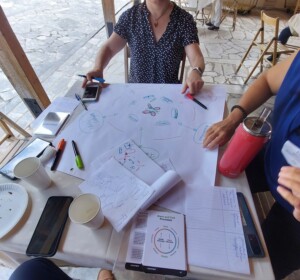
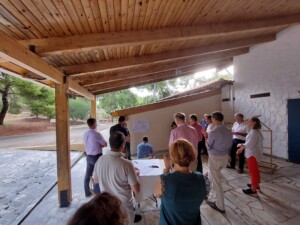
The creation of an organizational model designed around the principle of interactive innovation in a small group, and the joint evaluation of the models of the different groups (Avots: István Madarász)
We can consider the task, when we worked in small groups to create fictitious, but definitely optimal organizational models, as a kind of synthesis of the knowledge material of the two days. Our small team tried to put together an advisory and knowledge transfer model that is characterized by both external and internal openness and that emphasizes the tireless search for synergy instead of organizational boundaries and rules.
As a result of the extremely positive participation of the two Hungarian delegates involved in decision preparation (content comments, suggestions, group dynamics), the organizers of the program recommend that training is organized in the i2c for government actors in the future.
Rita Szekeresné Köteles, István Madarász (AM) un Ágnes Jakab (NAK)
